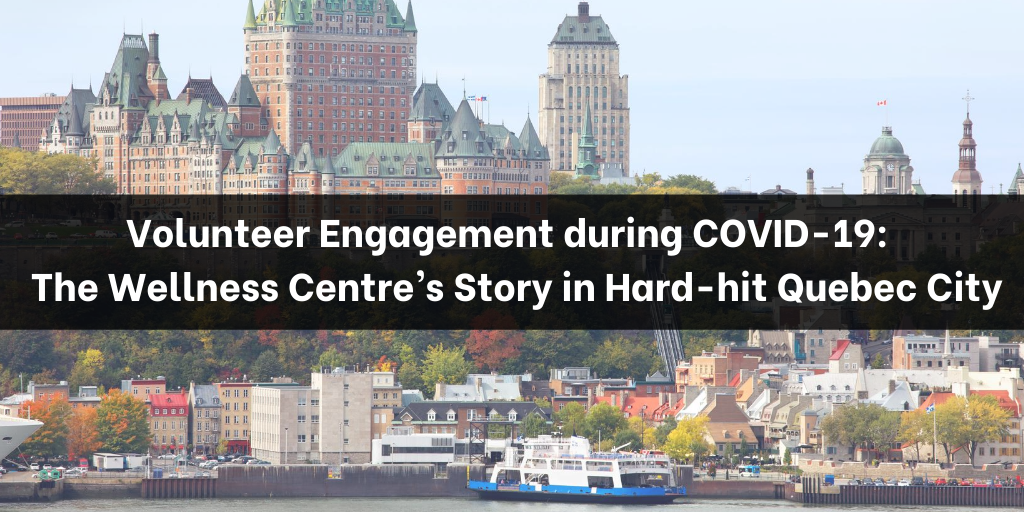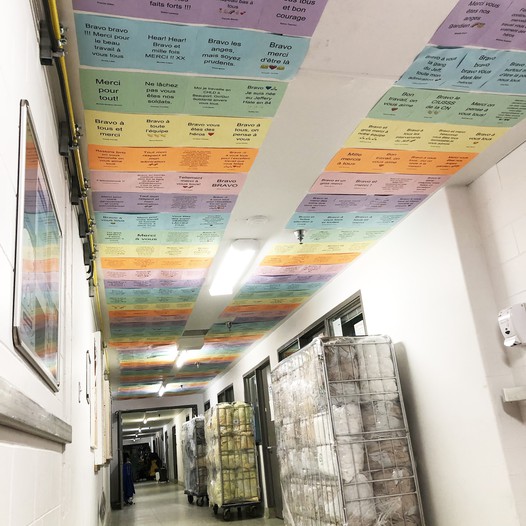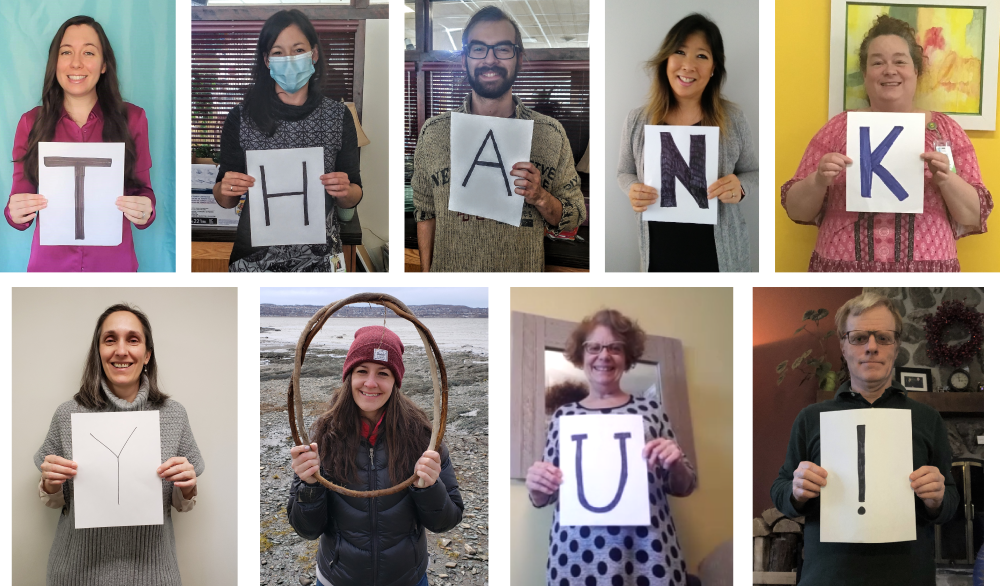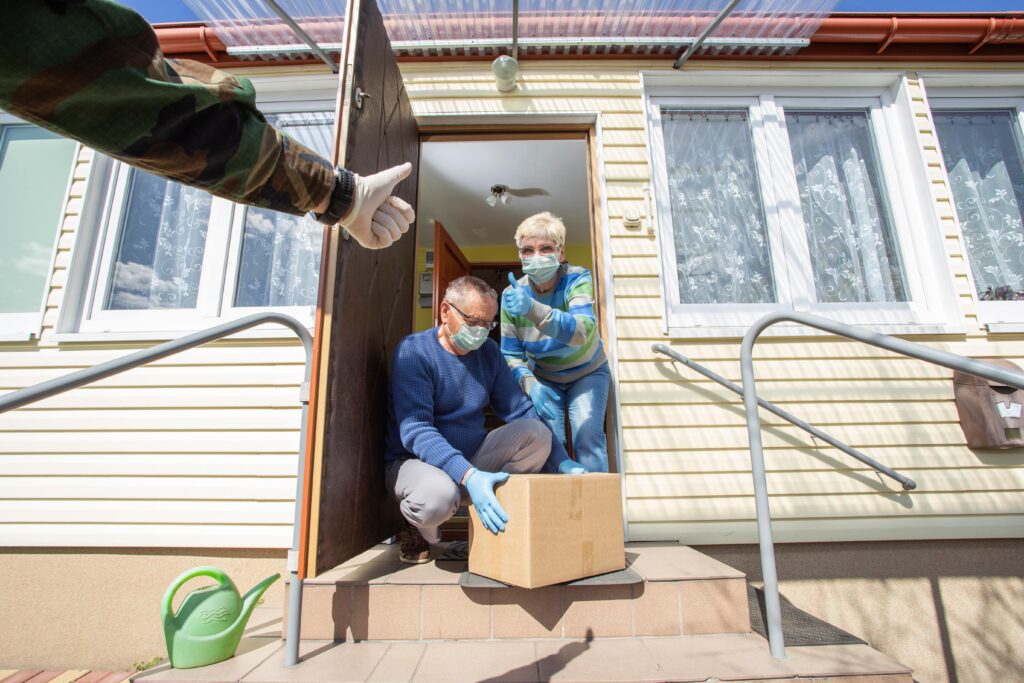
Ce blogue est disponible en anglais seulement.
First, it needs to be acknowledged that the global pandemic has been challenging for all of us, both personally and professionally. These unprecedented times have required every organization to innovate on a dime, including non-profits that have had to find creative ways to engage and mobilize volunteers.
Four months in, we are realizing that coming out the other side of COVID-19 will not mean “back to normal” but a “new normal”. The pandemic will shape our communities for years to come. Read on to learn how the community Wellness Centre in Quebec City adapted to face the crisis and hold on to volunteers in the process.
Adapting takes time and creativity
Like most, we closed shop in mid-March to process information to help us understand the big picture of the risk-laden COVID-19. We immediately redirected our efforts to respond to our community’s most urgent needs through our Temporary COVID-19 Response Efforts, prioritizing getting groceries to homebound, at-risk persons or those in self-isolation; transporting vulnerable seniors to their medical appointments; providing social support for parents in difficulty and for families with special needs, and respite care for caregivers.
Our staff tested and manned these initiatives, while we simultaneously conducted our risk assessment for volunteer-supported efforts to be reviewed by our Board of Directors and insurers. We also formulated procedures that took into consideration the rapidly evolving recommendations for volunteer involvement.
Meanwhile, we were inundated with volunteers wishing to help. We advised them that we needed to channel their goodwill wisely and safely, inviting them to add their names to our standby list. This way, we could re-arrange our volunteer tasks while screening new volunteers whom we would be able to call upon once we were ready.
We quickly began to adapt a great many of our programs into a virtual format, primarily support groups and information sessions, as well as some activities. Our in-person Day Centre for seniors was replaced with a phone call service run by our employees with whom our clients already had longstanding relationship of trust. Our Caregiver’s Art Therapy class went virtual through art kits delivered to participants’ doors. A one-on-one yoga class for special needs youth on Zoom helped siblings to bond while their parents were able to take a breather. A live workout on Zoom led by a dad for dads and their children helped many families get moving in the spring when the mood was low.
COVID-19 hit Quebec’s long-term care centres very hard. Seniors’ residences were locked down with access highly restricted to protect residents. The activities we organize and power with volunteers at our local long-term care seniors home were pared down into one sole mission: to connect caregivers and family members to their loved ones through prearranged video calls.
You can never eliminate all risk, but you can mitigate it
Tact and transparency were essential when informing and screening our volunteers―specifically at-risk volunteers―who were helping with the response efforts. We explained that limiting the spread of the virus was everyone’s top priority. Many understood that they had to step back but felt guilty that they would be absent from the lives of those with whom they had previously been so closely connected. We reassured our volunteers that we would be diligently monitoring the persons who had been using our services prior to March as well as any community members who chose to reach out to us after that point in time. Although we found ourselves working as a smaller team, we had to be careful moving forward to protect the community’s overall well-being.
We excluded symptomatic persons and found ways to enable volunteers at-risk to help remotely whenever possible. We enforced protective measures and detailed procedures for hand washing, respiratory etiquette (coughing and sneezing), and hygiene standards for equipment and high-touch surfaces. Where such measures were insufficient, we adjusted our procedures, or sometimes simply ended the volunteer effort altogether, such as replacing at-home visits to isolated seniors with friendly calls. Volunteer-led parent meetups and breastfeeding support groups previously held in groups at our centre were switched to virtual venues.
Taking volunteers along
Communicate, communicate, communicate! We kept our volunteers updated on the state of our services and what our organization was doing in response to COVID-19. We offered informal volunteering options such as checking in with family members, neighbours and community members and shared provincial guidelines for these actions. We asked them to refer those in need to us and so many volunteers served as informal ambassadors. We shared remote volunteering opportunities led by the federal government (data-tracing), our local university (research participants on wellbeing during COVID-19) and community organizations (recruiting for a 60+ Senior Inclusion Committee).

We also saw our own organic virtual volunteering movement spring forth: letters of encouragement for seniors in the long-term and palliative care unit at Jeffery Hale Hospital and for senior residents of Saint Brigid’s Home. The rainbow of hope initiative at the Jeffery Hale Hospital emerged from community members wishing to send a message of encouragement to the doctors, nurses and staff working there. By late May, this unique 150-year-old bilingual health establishment was battling a serious outbreak of the little-understood virus while facing a serious staffing shortage at the same time. Our community’s hearts went out to them in a spontaneous flow of words. This gesture was a real morale booster for everyone, including our volunteers who, due to their forced inaction, felt like they were no longer able to make a difference.
We did not skip over National Volunteer Week, a key event that holds great meaning for our volunteers. We chose a creative form of recognition in the form of a personalized message from us to say that we shared in their dismay that we could not get together in person but that we were thinking of them. We said that we hoped that they and their loved ones were following protective measures to remain safe and thanked them for their ongoing engagement. We took the opportunity to remind them that, although volunteering as they knew it at the Wellness Centre was on pause, volunteering is an act of solidarity and compassion that also includes the simple act of following protective measures to stop the spread of the virus in the community.

Given our organization’s wellness mission, we shared support resources for those who were perhaps struggling among our volunteer group. Keep in mind that many persons give their time to reduce their own isolation or to feel like they contribute to the community in a meaningful way. Many felt distressed by the loss of their usual volunteer activities at the Centre.
Change is hard, but is easier with the right information and mindset
To mobilize volunteers, we began with information by producing an educational training video covering how the virus spreads. This helped to convey that our procedures were based on a solid foundation of logic. Next, we provided step-by-step written procedures for each response effort, outlining basic protective measures including physical distancing rules (with emphasis on staying home when sick) proper hand hygiene, and respiratory etiquette. In some cases, further measures were also required: the use of personal protective equipment (PPE) such as masks and gloves, as well as the use of hand sanitizer and disinfecting wipes. When introducing this equipment, it was crucial for us to be very clear about when to use it and how to use it properly. We certainly did not want to give our volunteers a false sense of security that could come from the use of PPE or replace their adherence to basic prevention measures. As the situation evolved, and continues to evolve, we are constantly reviewing best practices set forth by the provincial government, by public health authorities, and by our partners in the local health care system.
Getting volunteers onboard with training, with procedures and with the use of protective equipment requires that we constantly remind them of the vulnerability of the persons they are helping. We also repeat often that our organization shares a deep concern for well-being of all of our volunteers. It is not easy for any volunteer to have to jump through new hoops, regardless of their level of experience. Simply recalling that they are doing it for the wellbeing of others, however, makes it easier to follow through on safety requirements. We stick to this basic message and constantly thank them for their continued understanding, flexibility and caring for the safety and wellbeing of others in these ever-evolving and unprecedented times.

Moving forward on unsure footing but with hope
Quebec’s COVID-19 situation is still quite serious. We are facing the highest number of reported cases, equaling over half of the total of all provinces combined. Our team of staff and our Board of Directors all agree that our primary objective is not re-opening so much as adapting to meet the community’s needs in creative ways that are in keeping with COVID-19 preventive measures. Re-organizing volunteering in the face of COVID-19 is OUR act of engagement towards volunteers. This demonstrates to the volunteers that we value them enough to put thought, care and concern into their role, place and safety within the organization every day and especially in the face of a global pandemic!
We realize that we cannot convert everything into a virtual format, nor can we adapt every volunteering task. Like so many organizations, however, the reason that we put volunteer engagement at our fore is to foster human interaction and community connectedness that simply cannot be achieved otherwise. Despite these trying times for our organization, its volunteers and for our community, we remain hopeful that our volunteers will orbit back to us when the risk subsides. We hope that our efforts to keep the community that we serve engaged and cared for are what will shine through when we think back on this challenging, historical year of 2020.
Amy Bilodeau
Volunteer Coordinator for the Wellness Centre
co-managed by Jeffery Hale Community Partners
